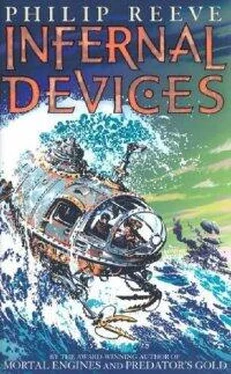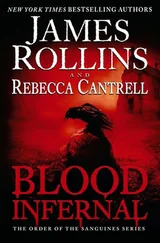As soon as he had locked his friends and the children inside Gargle’s quarters, Caul sprinted back up the stairs to the chamber of screens. He was shuddering slightly, and half inclined to go back down and unlock the doors again. He kept telling himself that he hadn’t chosen Uncle over Freya and the others; he would find a way to stay true to both of them.
“First thing we must do,” said Uncle when Caul rejoined him, “is to get rid of those women. Bad luck, they’ll be. You’ll see.” He had filled his screens with images of the captives in the room below: big, grainy close-ups of Hester and Freya. He said, “They look very pretty, I’m sure, and no doubt you think they’re very sweet, but they’ll twist round and betray you, like my Anna did me all those years ago. That’s why I’ve always made it the rule that there ain’t no girls in Grimsby.”
Caul put down Hester’s gun. He felt stupid, standing there holding it. “But what about the girl who was aboard the Autolycus with Gargle?”
“Young Remora?” Uncle snatched the gun and stuffed it away inside his filthy clothes. “I know what you mean. Odd-looking lad. High-pitched voice. Long hair. Too much makeup. I had my doubts when Gargle first introduced me, but Gargle assured me he was a boy. A fine burglar. Poor Remora. I suppose he’s dead too?”
“Uncle, there are girls among those poor children we found downstairs. Lots of them are girls.”
“Girls? You’re sure?” Uncle started thumbing his remote control, hunting for close-ups of the children. Caul saw his friends on the screens look up nervously as crab-cams spidered around on the ceiling above them, jangling Remora’s mobiles. Uncle saw only grayish, face-shaped blurs. “Maybe Gargle’s kidnapping squads have grabbed a few girls by mistake,” he muttered grudgingly. “We’ll have to get rid of them, too, if we’re to make a new start. And we will make a new start, Caul, my boy. We’ll rebuild Grimsby, stronger and better than it ever was before, and you’ll be my right hand. You can move into Gargle’s pad and look after things for me like Gargle used to do.”
One of the banks of screens behind him suddenly died, leaving the room even more dimly lit than before. There was a smell of burned wiring, and when Caul went to investigate, he saw that water was flooding down the surfaces of the screens and pooling on the floor below. He touched some to his lips and tasted brine. Uncle Knows Best, he told himself, and he wanted to believe it because it would have been good l62 to go back to the old days, when he had been so certain about everything. Everybody had to believe in something better and greater than themselves. Tom and Freya had their gods, and Hester had Tom, and Caul had Uncle. He would not let Uncle down again, even though he was old, and blind, and confused; even though there was probably nothing that could save Grimsby from the sea.
But he would not let his friends drown with him.
“You look tired, Uncle,” he said gently. It was true. How long had the old man been alone in this room, staring at the treacherous message from Brighton on his walls of screens? Caul touched his hand. “You should get some rest, now that I’m here to keep an eye on things.”
Uncle’s head jerked round to stare at him, his eyes glittering with something of their old cunning. “You trying to trick me, Caul? That’s what Gargle did. ‘Have a nap, Uncle dear,’ he’d say. ‘Lie down for forty winks, Uncle.’ And when I woke up, some of my stuff would be missing, or another boy I’d trusted would be dead, and Gargle would be telling me it had been an accident…”
“Why did you let him get away with it?” asked Caul.
The old man shrugged. “ ’Cos I was scared of him. And ’cos I was proud of him. He was a sharp one, that Gargle, and it was me who made him that way. He was like a son to me, I s’pose. I like to think that me and Anna might have had sons, if she hadn’t tricked me and flown off in that homemade airship of hers. I like to think they’d have been as sharp as Gargle. But I’m glad he’s gone, Caul, my boy. I’m glad it’s you here now.”
Mumbling quietly to himself, Uncle let Caul lead him up the steep stair to his bedchamber. The midget engine pods of the old cargo balloon whined and clattered as the ball of screens went with them, hanging a few feet above their heads so that Uncle could keep staring up at it, his half-blind eyes flicking nervously from one screen to another. The entrance to his bedroom had been made higher and wider to let the balloon squeeze through. “Gotta keep watching them, Caul,” he muttered. “Never know what they’ll get up to unwatched. Gotta watch everybody. Everywhere. Always.”
The room had been richly furnished once, for the Lost Boys had brought all the finest things they stole here as tribute to Uncle. But over the years, piece by piece, Gargle must have found excuses to move all the treasures downstairs to his own quarters. All that remained was a bed with a threadbare quilt, some piles of moldy books, and an upturned crate that served as a bedside table; it held an old argon lamp and a faded photograph of a beautiful young woman in the uniform of an Arkangel slave worker.
“I keep that to remind me,” said Uncle, when he saw Caul looking at the picture, and quickly turned it facedown. “My Anna Fang. Pretty, weren’t she? They’ve gone and made a Stalker of her now, and put her in charge of the Green Storm, and she rules over half the world, with airships and armies at her command. I’ve followed her career. Got a book of cuttings, somewhere. Gargle thought he could do a deal with her, but I knew it wouldn’t work. Knew it would only lead to trouble…”
“What sort of deal?” asked Caul. He had heard Uncle talk about his lost love once before, but he had never heard of the Lost Boys trying to do a deal with the world outside. “Is that why Gargle came to Anchorage? Why he wanted the Tin Book?”
Uncle sat down on the bed, and his moon of surveillance screens dipped until it was hanging just above his head. “Gargle said there was trouble coming. As soon as those first three limpets went missing, he said, ‘There’s trouble coming.’ He was right, too, wasn’t he? Only he didn’t know how soon. He thought if he got hold of that Tin Book, he could give it to the Green Storm and ask for their protection in exchange, get them to smash whatever city came hunting for us.”
“But why would they want the Tin Book?” asked Caul.
“Who knows?” replied Uncle with a shrug. “A couple of summers back, they sent an expedition to try and find the wreck of Anchorage. They didn’t, of course. But Gargle got a crab-cam aboard their ship, and he found out what it was they was hoping to dredge up.”
“The Tin Book?”
Uncle nodded. “They weren’t ordinary Green Storm, neither. They were special agents, who reported straight to her. So Gargle thought, if she’s ready to send ships halfway round the world in the middle of a war looking for this thing, she must want it pretty bad. And he remembered seeing something like it when he was burgling Anchorage that time, only he didn’t think nothing of it then.” He shook his head. “I told him it wouldn’t work. I told him to stay put. But he was like that, young Gargle; once he got an idea in his head, there weren’t no stopping him, and off he went, and now he’s dead, and that wicked city’s stolen all my boys away.”
“But what was it?” asked Caul. “The Tin Book, I mean? What makes it so valuable?”
Uncle, who had been sniffling miserably, blew his nose on a polka-dot handkerchief and peered at Caul. “Don’t know,” he said. “We never did find out. Gargle put about the story that it was the plans to some great big Ancient submarine that would save us all, but I think he made that up. What would my poor Anna want with a submarine? No. I reckon it’s a weapon. Something big.”
Читать дальше












